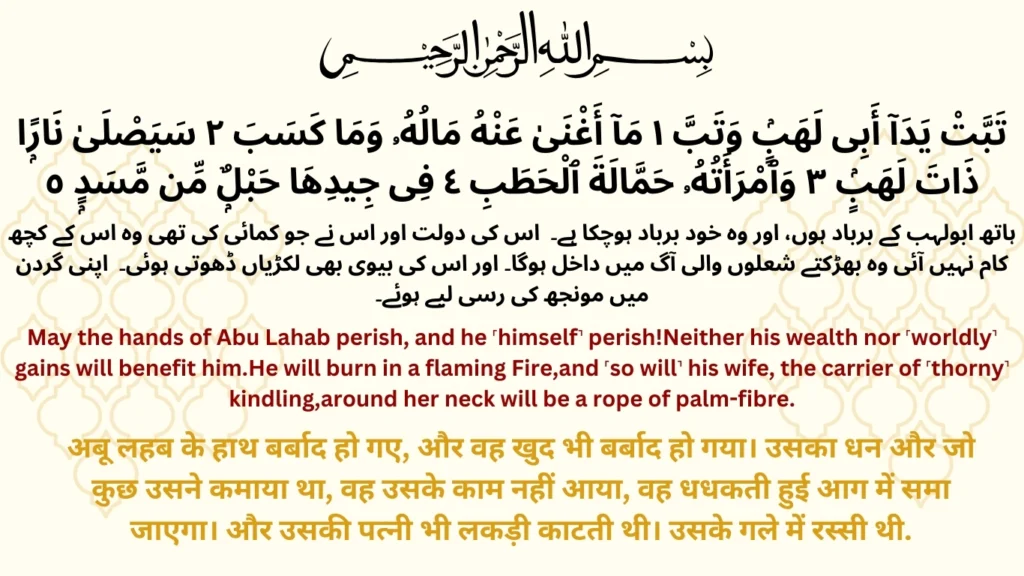Surah Lahab, also known as Surah Al-Masad, is one of the most striking chapters in the Quran. It is a brief yet powerful message that delivers a profound lesson about the consequences of disbelief and opposition to divine guidance. This blog post aims to explore the meaning, context, and lessons of Surah Lahab, making it relevant and engaging for young readers and those new to its teachings.
Surah Lahab Translation in Urdu Hindi and English

The Historical of Surah Lahab
Surah Lahab is the 111th chapter of the Quran and consists of only five verses. It specifically addresses the fate of Abu Lahab, a staunch opponent of Prophet Muhammad (PBUH). Abu Lahab was not just any adversary; he was the Prophet’s uncle, making his opposition deeply personal and painful.
Abu Lahab’s Hostility Towards Islam
Abu Lahab’s enmity towards Islam was relentless. He mocked, ridiculed, and opposed the Prophet openly. His actions were driven by arrogance and a sense of superiority, blinded by his status and wealth. This intense opposition led to his downfall, as highlighted in this Surah.
The Revelation of Surah Lahab
This Surah was revealed in Makkah, during the early years of Islam. At a time when the Prophet faced severe opposition, this Surah provided solace and a reminder that divine justice would prevail. It is one of the few chapters in the Quran that names an individual, underscoring the severity of Abu Lahab’s actions.
Breakdown of Surah Lahab
“May Abu Lahab’s hands face hardship, and may he encounter challenges too!”
The opening verse is a powerful declaration of Abu Lahab’s doomed fate. The expression “may the hands perish” signifies total destruction and defeat. It indicates that all his efforts and plots against Islam will come to nothing.
“Neither his wealth nor ˹worldly˺ gains will benefit him.”
Despite his immense wealth, Abu Lahab’s material possessions couldn’t save him. This verse serves as a reminder that worldly gains hold no value in the face of divine judgment. It’s a stark warning against arrogance and misplaced reliance on material wealth.
“He will burn in a flaming Fire,”
The imagery of burning in a flaming fire is both literal and metaphorical. It symbolizes the severe punishment awaiting Abu Lahab in the afterlife. This verse emphasizes the dire consequences of rejecting divine guidance.
A kindling gatherer and his wife will share the same fate.
Abu Lahab’s wife, Umm Jamil, was equally hostile towards the Prophet. She is described as the carrier of thorny kindling, referring to her practice of placing thorns in the Prophet’s path. Her fate is intertwined with Abu Lahab’s, highlighting the shared consequences of their actions.
She’ll wear a palm-fibre necklace, a beautiful piece of jewelry that symbolizes strength and tradition. Handcrafted with care, each strand of the necklace represents resilience and holds a deep cultural significance passed down through generations.
The final verse paints a vivid picture of Umm Jamil’s punishment. A rope of palm-fibre around her neck signifies humiliation and suffering. It serves as a potent reminder that actions rooted in malice and harm towards others will lead to one’s downfall.
Lessons from Surah Lahab
The Consequences of Arrogance
Abu Lahab’s story is a cautionary tale about the dangers of arrogance and pride. His refusal to accept the message of Islam, despite being closely related to the Prophet, led to his eternal suffering. It teaches us to approach faith with humility and openness.
The Futility of Material Wealth
This Surah underscores that material wealth and status hold no value in the eyes of God. Abu Lahab’s riches could not shield him from divine retribution. This lesson is particularly relevant in today’s materialistic world, urging us to prioritize spiritual values over worldly gains.
Justice and Accountability
Surah Lahab reaffirms the concept of divine justice. It reassures believers that those who oppose and harm others unjustly will face consequences. This message provides comfort to those who face oppression, knowing that ultimate justice lies with God.
The Power of Divine Decree
The fate of Abu Lahab and his wife as described in this Surah is a testament to the power of divine decree. It reminds us that God’s will is absolute and will prevail regardless of human resistance.
Conclusion
Surah Lahab is a profound chapter that offers timeless lessons about faith, humility, and justice. Its message is clear opposition to divine guidance and malicious actions will lead to one’s downfall, regardless of worldly status or wealth. For young readers and those new to the teachings of Islam, this Surah serves as a powerful reminder to live with humility, seek spiritual growth, and trust in divine justice.

